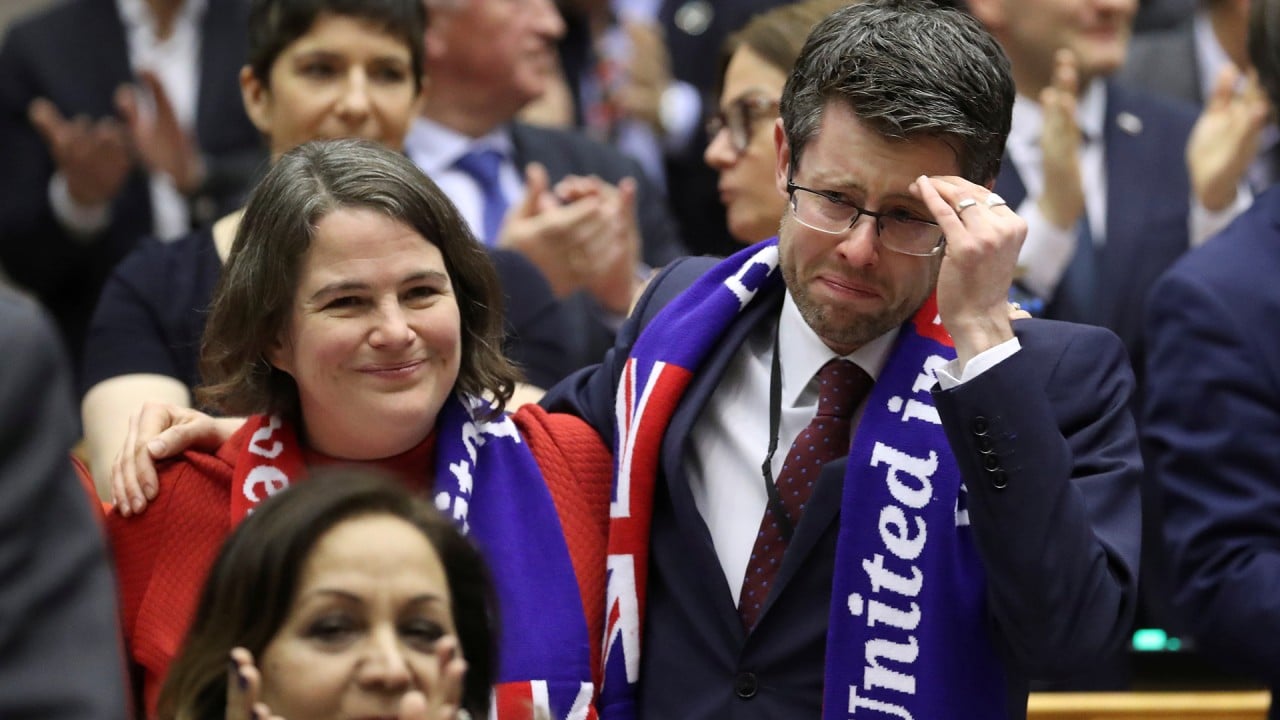
Britain and EU strike post-Brexit trade deal
- Last-gasp Brexit deal comes just days before Britain is set to leave the EU’s single market
- ‘We have taken back control of our destiny,’ British PM Boris Johnson says.
The deal, agreed on more than four years after Britain voted narrowly to leave the bloc, means it has averted a chaotic finale to the tortuous divorce that has shaken the 70-year project to forge European unity from the ruins of World War II.
It will preserve Britain’s zero-tariff and zero-quota access to the bloc’s single market of 450 million consumers, but will not prevent economic pain and disruption for the United Kingdom or for EU member states.
Many aspects of Britain’s future relationship with the EU remain to be hammered out, possibly over years.

“It was a long and winding road,” European Commission President Ursula von der Leyen told reporters. “But we have got a good deal to show for it. It is fair, it is a balanced deal, and it is the right and responsible thing to do for both sides.”
“We will be an independent coastal state,” he said. “We will be able to decide how and where to stimulate new jobs.”
The UK formally left the EU on January 31 but has since been in a transition period under which rules on trade, travel and business remained unchanged until the end of this year.
Johnson described the last-minute agreement as a “jumbo” free trade deal along the lines of that done between the European Union and Canada, and urged Britain to move on from the divisions caused by the 2016 Brexit referendum.
The deal will also support the peace in Northern Ireland – a priority for US President-elect Joe Biden, who had warned Johnson that he must uphold the 1998 Good Friday Agreement.
EU member Ireland said the deal, which the Commission website said would be published soon, protected its interests as well as could possibly have been hoped.
The trade pact will not cover services, which make up 80 per cent of the British economy, including a banking industry that positions London as the only financial capital to rival New York. Access to the EU market for UK-based banks, insurers and asset managers will become patchy at best.
Johnson said the deal did not contain as much as he would have liked on regulatory equivalence for financial services, but still contained some “good language”.
Lead EU negotiator Michel Barnier was able to say for the first time in four long years: “The clock is no longer ticking.”
While the last-minute deal prevents the most acrimonious ending to the saga on January 1, Britain is set for a much more distant relationship with its biggest trade partner than almost anyone expected at the time of the 2016 referendum.
A deal had seemed imminent for almost a day, until haggling over just how much fish EU boats should be able to catch in British waters delayed the announcement of one of the most important trade deals in recent European history.
Former British prime ministers David Cameron and Theresa May, who both resigned over Brexit in recent years, welcomed the pact.
“Trade deal is very welcome,” Cameron said on Twitter, adding it was “good to end a difficult year with some positive news”.
In her own message, May added: “Very welcome news that the UK & EU have reached agreement on the terms of a deal – one that provides confidence to business and helps keep trade flowing.”
German Chancellor Angela Merkel said she was “confident” the deal was a “good outcome”.
“We will quickly be able to determine whether Germany can support today’s result of the negotiations,” she said in a statement, adding that her cabinet would meet on Monday to review the accord.
First Minister Nicola Sturgeon said it was time for Scotland to be “an independent, European nation”.
“Before the spin starts, it’s worth remembering that Brexit is happening against Scotland’s will,” she added on Twitter. “And there is no deal that will ever make up for what Brexit takes away from us.”
Irish Prime Minister Micheal Martin hailed the pact as a “very welcome” development on Thursday, saying it would pave the way for a “good relationship in the years ahead”.
Brexit campaigner Nigel Farage said the deal would keep Britain far too closely aligned with the EU, adding that he hoped this would be the beginning of the end of the bloc.
Wang Yiwei, an international relations professor at China’s Renmin University, said it was expected that the two sides would reach an agreement because neither Britain nor the EU could afford the consequences of a disorderly no-deal Brexit.
“In particular, the EU is also facing dual pressures from China and the United States. After Brexit, without the constraints of the European Union, the United Kingdom will move closer to the United States and the Five Eyes alliance.” he said.
“Many people thought that after Brexit, they could sign an FTA with China. Now it seems difficult. Because FTA is also related to security and technology fields, the UK has now moved towards a conservative and values-oriented China policy. So the Sino-British relations have faced relatively big troubles in the past two years.”

02:33
European Parliament bids farewell to United Kingdom with ‘Auld Lang Syne’
“Brexit weakens both Britain and the European Union. The UK can only play its role to the fullest within the EU system,” said Song Luzheng, an international relations researcher at Fudan University.
“After Brexit, the ability of the United Kingdom and the European Union to negotiate on dealing with China has been weakened.”
Additional reporting by Rachel Zhang

